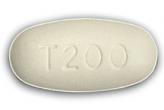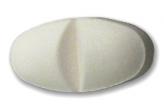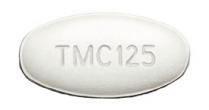Drug information
| drug-audio-en-398.mp3 |
(The drug image[s] shown above are of brand products only. There may be other available products not shown.)
What are the most important things to know about etravirine? What are the most important things to know about etravirine?
What are the most important things to know about etravirine?
Etravirine can cause serious, life-threatening side effects. These include severe skin rash and allergic reactions.
Contact your health care provider right away if you develop a rash while taking etravirine. Stop taking etravirine and get medical help right away if you develop a rash with any of the following symptoms:
- General ill feeling
- Extreme tiredness
- Muscle or joint aches
- Fever
- Blistering or peeling skin
- Blisters or sores in your mouth
- Redness or swelling of the eyes (conjunctivitis)
- Swelling of your face, lips, mouth, tongue, or throat
- Trouble breathing or swallowing
Allergic reactions may affect body organs, such as your liver. Contact your healthcare provider right away if you develop any of the following symptoms of liver problems:
- Yellowing of your skin or the whites of your eyes (jaundice)
- Dark-colored urine
- Light-colored bowel movements
- Loss of appetite for several days or longer
- Nausea or vomiting
- Pain, aching, or tenderness on the right side of your stomach/abdominal area
- Itching
While taking etravirine, it is important to keep all of your appointments with your health care provider.
What is etravirine?What is etravirine?
What is etravirine?
Etravirine (brand name: Intelence) is a prescription medicine approved by the U.S. Food and Drug Administration (FDA) for the treatment of HIV infection in adults and children 2 years of age and older who weigh at least 22 lb (10 kg) and who have taken HIV medicines in the past. Etravirine is always used in combination with other HIV medicines.
For more information on the use of etravirine in people with HIV, please refer to the Guidelines for the Use of Antiretroviral Agents in Adults and Adolescents with HIV and the Guidelines for the Use of Antiretroviral Agents in Pediatric HIV Infection.
HIV medicines cannot cure HIV/AIDS, but taking HIV medicines every day helps people with HIV live longer, healthier lives. HIV medicines also reduce the risk of HIV transmission. If you are taking HIV medicines, do not cut down on, skip, or stop taking them unless your health care provider tells you to.
What should I tell my health care provider before taking etravirine?What should I tell my health care provider before taking etravirine?
What should I tell my health care provider before taking etravirine?
Before taking etravirine, tell your health care provider:
- If you are allergic to etravirine or any other medicines.
- If you have liver problems, including hepatitis B virus infection (HBV) or hepatitis C virus infection (HCV).
- If you have any other medical conditions.
- If you are pregnant or plan to become pregnant. Talk to your health care provider about the risks and benefits of taking etravirine during pregnancy. For more information on the use of etravirine during pregnancy, please refer to the Recommendations for the Use of Antiretroviral Drugs During Pregnancy and Interventions to Reduce Perinatal HIV Transmission in the United States.
- If you are breastfeeding or plan to breastfeed. For mothers with HIV in the United States, the Guideline recommends speaking with your health care provider to discuss options for feeding your baby. Mothers with suppressed viral load have a less than 1% chance of transmitting HIV to their baby via their own milk. Although most medicines are safe to use while breastfeeding, some medicines should be avoided. Always let your health care provider know about all the medicines and supplements you are using before you start breastfeeding.
- If you are using hormone-based birth control (such as pills, implants, or vaginal rings). For more information about using birth control and HIV medicines at the same time, view the HIVinfo HIV and Birth Control infographic.
- About other prescription and nonprescription medicines, vitamins, nutritional supplements, and herbal products (including St. John's wort) you are taking or plan to take. Etravirine may affect the way other medicines or products work, and other medicines or products may affect how etravirine works. Taking etravirine together with certain medicines or products may cause serious side effects.
How should I take etravirine?How should I take etravirine?
How should I take etravirine?
Etravirine comes in 25-mg, 100-mg, and 200-mg tablets.
Take etravirine according to your health care provider’s instructions. Do not miss a dose of etravirine, and do not change your dose or stop taking etravirine without first talking with your health care provider.
Always take etravirine after a meal. Do not take etravirine on an empty stomach. Swallow the tablets whole with a liquid such as water. Do not chew the tablets.
If you are unable to swallow the etravirine tablets whole, you may take your dose of etravirine as follows:
- Measure 1 teaspoon of water and pour into a cup.
- Place the tablets in the cup containing the teaspoon of water. If needed, add more water to cover the tablets. Do not put the tablets in other liquids.
- Stir well until the water looks milky.
- Add a small amount (about 1 tablespoon) of liquid. Water may be used but adding orange juice or milk instead of water may make the mixture easier to drink. Do not use warm (more than 104°F or 40°C) or carbonated beverages.
- Drink the mixture right away.
- Add more water, orange juice, or milk to the cup to rinse the cup several times, and completely swallow the rinse each time to make sure you take the entire dose of etravirine.
Always take etravirine in combination with other HIV medicines.
If you have taken too much etravirine, contact your health care provider or local poison control center (1-800-222-1222 or online) right away, or go to the nearest hospital emergency room.
For more information on how to take etravirine, see the FDA drug label.
What should I do if I forget a dose?What should I do if I forget a dose?
What should I do if I forget a dose?
If you miss a dose of etravirine, take the missed dose as soon as you remember it. But if it is almost time for your next dose, skip the missed dose and just take your next dose at the regular time. Do not take two doses at the same time to make up for a missed dose.
What side effects can etravirine cause?What side effects can etravirine cause?
What side effects can etravirine cause?
Etravirine may cause side effects. Some side effects of etravirine can be serious as noted above. Many side effects from HIV medicines, such as nausea or occasional dizziness, are manageable. See the HIVinfo fact sheet on HIV Medicines and Side Effects for more information.
Other possible side effects of etravirine include:
- Changes in body fat (lipodystrophy syndrome).
- Changes in your immune system (called immune reconstitution inflammatory syndrome or IRIS). IRIS is a condition that sometimes occurs when the immune system begins to recover after treatment with an HIV medicine. As the immune system gets stronger, it may have an increased response to a previously hidden infection.
Tell your health care provider if you have any side effect that bothers you or that does not go away.
These are not all the possible side effects of etravirine. To learn more about possible side effects of etravirine, read the drug label or package insert or talk to your health care provider or pharmacist.
You can report side effects to FDA at 1-800-FDA-1088 (1-800-332-1088) or online.
How should etravirine be stored?How should etravirine be stored?
How should etravirine be stored?
- Store etravirine at room temperature, 68°F to 77°F (20°C to 25°C).
- Keep etravirine in the container that it came in and keep the container tightly closed and away from moisture. If the container has a small packet of drying agent (called a desiccant), do not remove it. The desiccant protects the medicine from moisture.
- Do not use etravirine if the original seal over the container opening is broken or missing.
- Throw away etravirine that is no longer needed or expired (out of date). Follow FDA guidelines on how to safely dispose of unused medicine.
- Keep etravirine and all medicines out of reach of children.
Where can I find more information about etravirine?Where can I find more information about etravirine?
Where can I find more information about etravirine?
- For more information on the use of etravirine in people with HIV, please refer to the Guidelines for the Use of Antiretroviral Agents in Adults and Adolescents with HIV and the Guidelines for the Use of Antiretroviral Agents in Pediatric HIV Infection.
- This Patient Version drug summary is based on the following FDA label(s): Tablet. The Patient Package Insert includes information for people taking etravirine.
- The American Hospital Formulary Service (AHFS) Patient Medication Information for etravirine available from MedlinePlus.
- Etravirine-related research studies, from ClinicalTrials.gov. (The ClinicalTrials.gov search can be modified so that you can get results that better match your interests.)
- A list of FDA-approved HIV medicines, from HIVinfo.
Manufacturer Information
Janssen
Main number: 800-526-7736
Patient assistance: 800-652-6227
Janssen CarePath: 866-836-0114
Last Reviewed: December 27, 2024



